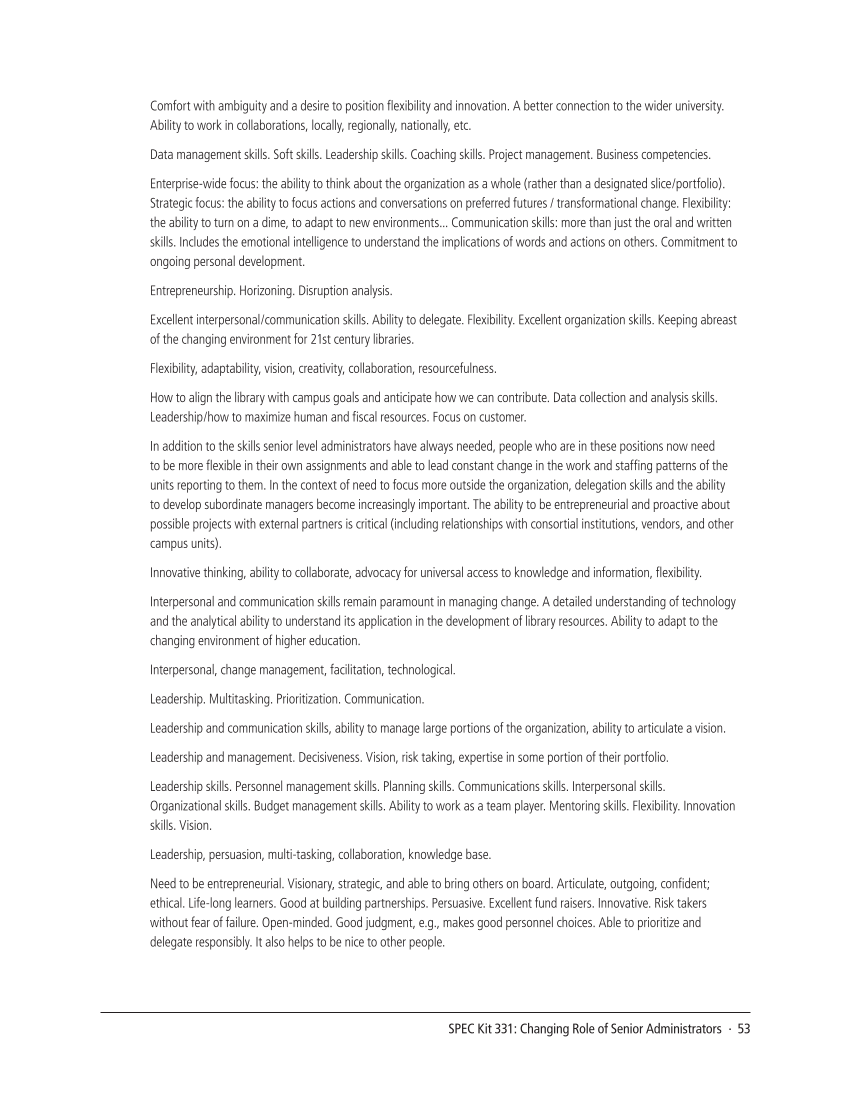SPEC Kit 331: Changing Role of Senior Administrators · 53
Comfort with ambiguity and a desire to position flexibility and innovation. A better connection to the wider university.
Ability to work in collaborations, locally, regionally, nationally, etc.
Data management skills. Soft skills. Leadership skills. Coaching skills. Project management. Business competencies.
Enterprise-wide focus: the ability to think about the organization as a whole (rather than a designated slice/portfolio).
Strategic focus: the ability to focus actions and conversations on preferred futures /transformational change. Flexibility:
the ability to turn on a dime, to adapt to new environments... Communication skills: more than just the oral and written
skills. Includes the emotional intelligence to understand the implications of words and actions on others. Commitment to
ongoing personal development.
Entrepreneurship. Horizoning. Disruption analysis.
Excellent interpersonal/communication skills. Ability to delegate. Flexibility. Excellent organization skills. Keeping abreast
of the changing environment for 21st century libraries.
Flexibility, adaptability, vision, creativity, collaboration, resourcefulness.
How to align the library with campus goals and anticipate how we can contribute. Data collection and analysis skills.
Leadership/how to maximize human and fiscal resources. Focus on customer.
In addition to the skills senior level administrators have always needed, people who are in these positions now need
to be more flexible in their own assignments and able to lead constant change in the work and staffing patterns of the
units reporting to them. In the context of need to focus more outside the organization, delegation skills and the ability
to develop subordinate managers become increasingly important. The ability to be entrepreneurial and proactive about
possible projects with external partners is critical (including relationships with consortial institutions, vendors, and other
campus units).
Innovative thinking, ability to collaborate, advocacy for universal access to knowledge and information, flexibility.
Interpersonal and communication skills remain paramount in managing change. A detailed understanding of technology
and the analytical ability to understand its application in the development of library resources. Ability to adapt to the
changing environment of higher education.
Interpersonal, change management, facilitation, technological.
Leadership. Multitasking. Prioritization. Communication.
Leadership and communication skills, ability to manage large portions of the organization, ability to articulate a vision.
Leadership and management. Decisiveness. Vision, risk taking, expertise in some portion of their portfolio.
Leadership skills. Personnel management skills. Planning skills. Communications skills. Interpersonal skills.
Organizational skills. Budget management skills. Ability to work as a team player. Mentoring skills. Flexibility. Innovation
skills. Vision.
Leadership, persuasion, multi-tasking, collaboration, knowledge base.
Need to be entrepreneurial. Visionary, strategic, and able to bring others on board. Articulate, outgoing, confident
ethical. Life-long learners. Good at building partnerships. Persuasive. Excellent fund raisers. Innovative. Risk takers
without fear of failure. Open-minded. Good judgment, e.g., makes good personnel choices. Able to prioritize and
delegate responsibly. It also helps to be nice to other people.
Comfort with ambiguity and a desire to position flexibility and innovation. A better connection to the wider university.
Ability to work in collaborations, locally, regionally, nationally, etc.
Data management skills. Soft skills. Leadership skills. Coaching skills. Project management. Business competencies.
Enterprise-wide focus: the ability to think about the organization as a whole (rather than a designated slice/portfolio).
Strategic focus: the ability to focus actions and conversations on preferred futures /transformational change. Flexibility:
the ability to turn on a dime, to adapt to new environments... Communication skills: more than just the oral and written
skills. Includes the emotional intelligence to understand the implications of words and actions on others. Commitment to
ongoing personal development.
Entrepreneurship. Horizoning. Disruption analysis.
Excellent interpersonal/communication skills. Ability to delegate. Flexibility. Excellent organization skills. Keeping abreast
of the changing environment for 21st century libraries.
Flexibility, adaptability, vision, creativity, collaboration, resourcefulness.
How to align the library with campus goals and anticipate how we can contribute. Data collection and analysis skills.
Leadership/how to maximize human and fiscal resources. Focus on customer.
In addition to the skills senior level administrators have always needed, people who are in these positions now need
to be more flexible in their own assignments and able to lead constant change in the work and staffing patterns of the
units reporting to them. In the context of need to focus more outside the organization, delegation skills and the ability
to develop subordinate managers become increasingly important. The ability to be entrepreneurial and proactive about
possible projects with external partners is critical (including relationships with consortial institutions, vendors, and other
campus units).
Innovative thinking, ability to collaborate, advocacy for universal access to knowledge and information, flexibility.
Interpersonal and communication skills remain paramount in managing change. A detailed understanding of technology
and the analytical ability to understand its application in the development of library resources. Ability to adapt to the
changing environment of higher education.
Interpersonal, change management, facilitation, technological.
Leadership. Multitasking. Prioritization. Communication.
Leadership and communication skills, ability to manage large portions of the organization, ability to articulate a vision.
Leadership and management. Decisiveness. Vision, risk taking, expertise in some portion of their portfolio.
Leadership skills. Personnel management skills. Planning skills. Communications skills. Interpersonal skills.
Organizational skills. Budget management skills. Ability to work as a team player. Mentoring skills. Flexibility. Innovation
skills. Vision.
Leadership, persuasion, multi-tasking, collaboration, knowledge base.
Need to be entrepreneurial. Visionary, strategic, and able to bring others on board. Articulate, outgoing, confident
ethical. Life-long learners. Good at building partnerships. Persuasive. Excellent fund raisers. Innovative. Risk takers
without fear of failure. Open-minded. Good judgment, e.g., makes good personnel choices. Able to prioritize and
delegate responsibly. It also helps to be nice to other people.














































































































































































